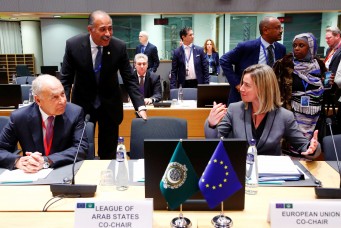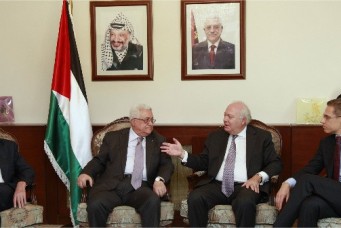The Arab League and the European Vision
Aside from the gaffes of US presidential candidates, much of the world’s attention today is focused on two specific regions: Europe and the Middle East. Both regions are facing significant challenges that beg for concerted action through their regional bodies. The European Union is dealing with a debt and confidence crisis of great magnitude and consequence, while the Arab League is trying to display unity and decisive action in the face of regional upheavals and the unacceptable methods used by some to quell challenges to their regimes. Both regional groupings are playing their future, with vast implications worldwide.
Aside from the gaffes of US presidential candidates, much of the world’s attention today is focused on two specific regions: Europe and the Middle East. Both regions are facing significant challenges that beg for concerted action through their regional bodies. The European Union is dealing with a debt and confidence crisis of great magnitude and consequence, while the Arab League is trying to display unity and decisive action in the face of regional upheavals and the unacceptable methods used by some to quell challenges to their regimes. Both regional groupings are playing their future, with vast implications worldwide.
The Arab League has a long, yet somewhat contested history. Established in 1945, it has accompanied the Arab world through highs and lows, at times coming together for decisive action and at other times criticized by the Arab public as an ineffective and disunited talking shop. But for over 60 years it has brought together the region’s main powers, today numbering 22, to discuss and attempt to resolve regional issues and conflict peacefully and between Arabs. When Iraq invaded Kuwait or Muammar al-Qadhafi declared war on his people, the Arab League acted decisively, if not with total unanimity. When Bahrain faced internal challenges the Arab League and Gulf Cooperation Council stepped in. Today we apply our efforts and bold decisions to the Syrian and Yemeni issues.
Where the Arab League has shown increased maturity and proactivity, taking centre stage in the resolution of Arab conflicts, the European Union, despite its far tighter integration, does not seem recently to be living up to the high pressures it faces today. The way it deals with threats to its common currency and economic integration will be decisive not only for the future of the Union but for our world economy. Europe has struggled throughout the past century to heal the wounds of its two world wars. It would be a great tragedy for its achievements of reconciliation and integration to fall due to economic indecision.
The shift we are seeing is that of a doubting Europe and an increasingly mature and proactive Arab world. Whether through the Arab League or the GCC, Arabs are showing a willingness to take risks in settling internal disputes, while Europe is showing timidity and indecision. The Arab League today is an organization to be reckoned with, no longer so hesitant about getting involved in regional issues. It is a grouping of increasing importance to our region’s future, allowing us to deal with our problems internally rather than through outside involvement. We must hope that the European Union recognizes the consequence of its present challenges, as it has proven a great exemplar of peace and stability in this world.
These two regions and regional organizations are both crucial to world economic and political stability. How they behave under current stress will be crucial in determining their future and what role they will play on the international scene. Let us take pride in the strides we as Arabs have taken, and let us hope that Europeans live up to the ideals of their Union to once again take their seat as a major factor of peace, stability and understanding in this world.
Hassan Yassin, a former head of the Saudi Information Office in Washington, is a political consultant based in Riyadh



